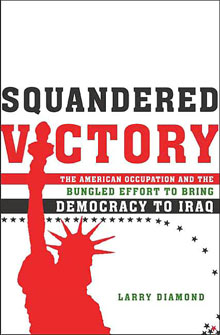Book Notes
 Larry Diamond, Squandered Victory; The American Occupation and The Bungled Effort To Bring Democracy To Iraq (New York: Times Books, 2005), 369pp.
Larry Diamond, Squandered Victory; The American Occupation and The Bungled Effort To Bring Democracy To Iraq (New York: Times Books, 2005), 369pp.
In late 2003 Condoleezza Rice telephoned her friend and Stanford colleague Larry Diamond of the Hoover Institution to ask him to go to Iraq as a senior adviser to the Coalition Provisional Authority in Baghdad. Although he had opposed the war with Iraq, after the fact he considered it a "moral imperative" to do everything within our power to establish a democracy there. As an expert in democratic development around the world, both as a scholar and an adviser-practitioner on the ground, few people are more qualified. He believed the Iraqis truly wanted democracy and were willing to work for it. He clearly has no axe to grind, and no compulsion to justify or condemn. Nor did he think the task was hopeless, at least when he went. He believes our intentions were good, and he is eager to give credit to the CPA and Iraqis where it is due.
Diamond spent four months in Baghdad (January to April 2004), and I think it is safe to say that few people worked harder or with more conviction, passion, enthusiasm, and sense of duty than he did. His book went to press in January 2005 right after the election results were announced. While there he focused his efforts on two tasks —he was one of the five drafters of the interim constitution, and he crisscrossed the country (until it became too unsafe to do so) promoting democracy development through speeches, conferences, town hall meetings, print and news media, seminars, and the like.
From the start, though, the Bush plan was a long shot. Imposing a democracy by force is oxymoronic, wherever you might try it. Attempting it in the Middle East, the only place in the world without a single democratic government, decreases your odds of success. The "cardinal sin," in Diamond's mind, was the pre-emptive war in the first place, for this put the United States on a course of "path dependence." A trajectory was set in motion, a chain reaction of events was unleashed, and almost none of it is reversible. A distinguished diplomat likened this to driving down a one-way street in the wrong direction; no matter what turns you make thereafter you are making more wrong turns. That's your best case scenario.
Now compound this with the "staggering failures" that the Bush administration made at "virtually every turn"— no post-war plan to secure the peace; substantial under-resourcing in troops, equipment, and money; an artificial time table to write a constitution, sell it to the country, and hold elections; interagency turf wars between governmental agencies and especially between the State Department and the Pentagon; disbanding the Iraqi army and de-Baathification that sidelined the only people in Iraq who knew how to rule; grossly underestimating Iraqi nationalism, resentment, disaffection, and suspicions of American motives; making numerous, important decisions in an unapologetically autocratic and undemocratic fashion (a point not lost on Iraqis); a dismissive and flippant contempt for all criticisms; willful and arrogant delusions; wishful thinking and bad information; ostracizing the United Nations; and horrible miscalculations regarding Sistani, Muqtada al-Sadr and Fallujah.
As the violent insurgency engulfed Iraq, Diamond watched much of what he and his CPA colleagues had accomplished unravel. Back in the United States, he decided not to return to Iraq. On April 26, 2004, he wrote his friend of twenty years, Condi Rice, a detailed, confidential memo. He never heard back. He has concluded that the Iraqi fiasco is well on its way to becoming "one of the major overseas blunders in US history." In his sharpest critique in the entire book, Diamond charges the Bush administration with "negligence on a monumental scale." He insists he means this not as a rhetorical flourish or verbal towel-snapping, but in the technical, legal sense of "gross or criminal negligence."
It will be years if not decades before a final verdict on Iraq is in, so predictions are risky. Oddly enough, Diamond still hopes that democracy of some attenuated sort might work in Iraq. For that to happen, three conditions must be met: the play of politics must be inclusive enough to encompass Sunnis and Kurds who feel threatened. Related, a balance of power must insure that no single group dominates the rest. In these first two conditions rests the contradiction between minority rights sought by the Kurds and Sunnis, and majority rule sought by the Shiites. Finally, Iraq's emerging politicians must evidence pragmatic flexibility as opposed to ideological rigidity.
If you read the newspapers, you do not learn much at all new in Diamond's book. What makes it compelling is his unique qualifications and inspirational dedication to the task. At the end of the day, if I was an insurgent who had the least bit of doubt whether my efforts were thwarting America's ill-conceived plans, I would be greatly heartened by this first person narrative of someone who chronicled his personal experiences up close and personal. So far we have been "simply overmatched" for a post-war conflict for which we were "grossly unprepared" (p. 291).


